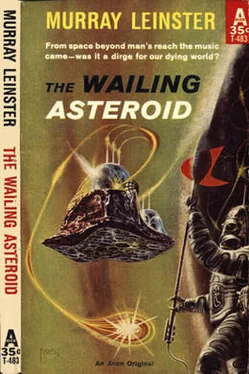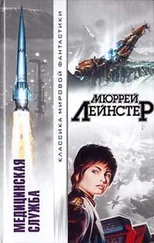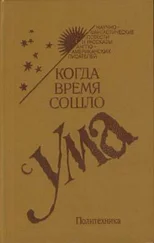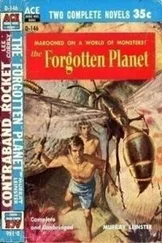Holmes turned away. Like the rest, he'd accepted great age, mentally, as a part of the nature of the fortress. But the collapse of emptied shipping–cases because they were touched was a shock. Where such decay existed, one could not hope to find anything useful for a modern emergency. He vanished.
Pam was indignant. She turned to Sandy.
"I wanted to say that I smelled fresh air," she protested. "And he acts like that!"
Sandy was not listening. She frowned.
"He could lose his way down here," she said shortly. "We'd better keep him in sight. I remember the way from my dream."
They followed Holmes, who did make his way back to the upper levels and ultimately to the ship without guidance. But Pam was intensely indignant.
"We could have gotten lost down there!" she said angrily when they were back in familiar territory. "And he wouldn't have cared! And I did smell fresh air! Not very fresh, but fresher than the aged and dried–out stuff we're breathing now!"
"You couldn't," said Sandy practically. "There simply couldn't be any, except in the ship where the hydroponic wall–gardens keep it fresh."
"But I did!" insisted Pam.
Sandy shrugged. They went into the ship, which Holmes had already reached and where he sat gloomily beside a black cube. He would have to sleep to get anything from it. There were only two of the freakish–seeming metal caps which made the cubes intelligible to a man awake, and Burke and Keller were using them. Holmes felt offended.
Sandy looked at a clock and began to prepare a meal. Pam, brooding, helped her.
Burke and Keller came back to the ship together. Keller looked pale. Burke seemed utterly grim.
"There's some stuff to be coded and sent back to Earth," he told Sandy. "Keller's got it written out. We know how to work the instruments up above, now. My brain's reeling a little, but I think I'll stay sane. Keller takes it in stride. And we know the trick the Enemy has."
Sandy put out plates for five.
"What is it?"
"Gravity," said Burke, evenly. "Artificial gravity. We don't know how to make it, but the people who built this fortress did, and the Enemy does. So they've made artificial–gravity fields to give their ships the seeming mass of suns, and they've set them in close orbits around each other. They'll come spinning into this solar system. What will happen when objects with the mass of suns—artificial or otherwise—come riding through between our sun and its planets? There'll be tidal stresses to crack the planets and let out their internal fires. There'll be no stability left in the sun. Maybe it'll be a low–grade nova when they've gone, surrounded by trash that once was worlds. Anyhow there'll be no humans left! And then the Enemy will go driving on toward the other solar systems that the builders of this fortress own. They can't conquer anything with a weapon like that, but they can surely destroy!"
Keller nodded distressedly. He gave Pam a number of sheets of paper, filled with his neat handwriting.
He said sorrowfully, "For Earth. In code."
Sandy served the meal she had prepared.
"It's a matter of days," said Burke curtly. "Not weeks. Just days."
He picked up a fork and began his meal.
"So," he said after a moment, with a sort of unnatural calm, "we've got to get the thing licked fast. Up in the instrument–room there are some theory–cubes—lectures on theories with which the operators of the room were probably required to be familiar. They were intended to figure out what the Enemy might come up with, so it could at least be reported before the fortress was destroyed. The trick of sun–gravity fields was suggested as possible, but it seemed preposterously difficult. Apparently, it was. It took the Enemy some thousands of years to get it. But they've got it, all right!"
"How do you know?" demanded Holmes.
"The disk with the red sparks in it," said Burke, "is a detector of gravity–fields. It sees by gravity, which is not radiation. Keller's sending instructions back to Earth telling how to make such detectors."
He busied himself with his food once more. After a moment he spoke again.
"We're going to try to get some help," he observed. "At least we'll try to find out if there's any help to be had. I think there's a chance. There was a civilization which built this fortress. Something happened to it. Perhaps it simply collapsed, like Rome and Greece and Egypt and Babylonia back on Earth. But on Earth when an old civilization died a new, young one rose in its place. If the one that built this fort collapsed, maybe a new one has risen in its stead. If so, it will need to defend itself against the Enemy just like the old culture did. It might prefer to do its fighting here, instead of in its own land. I think we may be able to contact it."
"How'll you look for them?"
Burke shrugged.
"I've some faint hope of a few directions in that sealed–up metal case with the inscription on it. I'm going to take some tools and break into it. It's a gamble, but there's nothing to lose."
He ate briskly, with a good appetite. Sandy was very silent.
Pam said abruptly, "We saw that case. And I smelled fresh air there. Not pure air like here in the ship, but not dead air like the air everywhere else."
"Near a power generator, Pam, there'd be some ozone," Holmes said patiently. "It makes a lot of difference."
"It wasn't ozone," said Pam firmly. "It was fresh air. Not canned air. Fresh!"
Holmes looked at Burke.
"Did you or Keller find out how the air's refreshed here? Did anybody throw a switch for air apparatus?"
Keller said mildly, "Apparatus, no. Air exchange, yes. I threw switches also for communication with base. Also emergency communication. Also dire emergency. Nothing happened."
"You see, Pam?" said Holmes. "It was ozone that made the air smell fresh."
Sandy was wholly silent until the meal was over. Then Holmes went moodily off with Keller, to use the cube–reading devices in the instrument–room and try to find, against all apparent probability, some clue or some communication which would enable something useful to be done. Holmes was trying hard to believe that things were not as bad as Burke announced, and not nearly so desperate that they had to try to find the descendants of a long–vanished civilization for a chance to offer resistance to the Enemy.
Keller said confidentially, just before they reached the instrument–room, "Burke's an optimist."
And at that moment, back in the little plastic spaceship, Burke was saying to Sandy, "You can come along if you like. There are a couple of things to be looked into. And if you want to come, Pam—"
But Pam touched the papers Keller had given her and said reservedly, "I'll code and send this stuff. Go ahead, Sandy."
Sandy rose. She followed Burke out of the ship. She was acutely aware that this was the first time since they had entered the ship that she and Burke could speak to each other when nobody could overhear. They'd spoken twice when the others were presumably asleep. But this was the first time they'd been alone.
When they'd passed through the door with the rounded corners, they were completely isolated. Overhead, brilliant light–tubes reached a full mile down the gallery in one direction, and half as far in the other. The vast corridor contained nothing to make a sound but themselves.
"It's this way," said Burke.
Sandy knew the way as well as he did, or better, but she accepted his direction. Their footsteps echoed and reëchoed, so that they were accompanied by countless reflections of heel–clicks along with the normal rustling and whispering sounds of walking.
They went a full quarter–mile from the ship–lock door, and came to a very large arched opening which gave entrance to a corridor slanting downward.
Читать дальше







